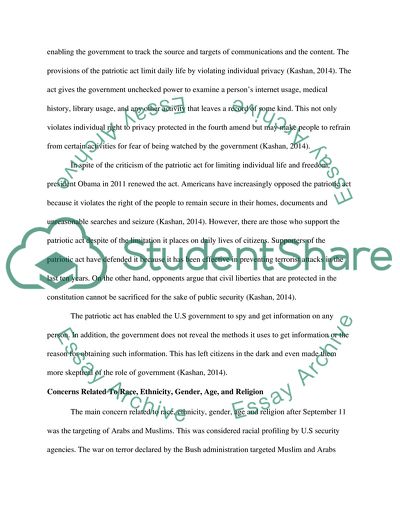Cite this document
(“Societal Implications of the USA Patriot Act and How It Limits Daily Essay”, n.d.)
Societal Implications of the USA Patriot Act and How It Limits Daily Essay. Retrieved from https://studentshare.org/politics/1667738-usa-patriot-act-and-how-and-how-its-adaptation-into-our-american-justice-system-has-helped-law-enforcement-at-all-levels-to-seek-out-and-find-weapons-of-mass-destruction-in-our-country
Societal Implications of the USA Patriot Act and How It Limits Daily Essay. Retrieved from https://studentshare.org/politics/1667738-usa-patriot-act-and-how-and-how-its-adaptation-into-our-american-justice-system-has-helped-law-enforcement-at-all-levels-to-seek-out-and-find-weapons-of-mass-destruction-in-our-country
(Societal Implications of the USA Patriot Act and How It Limits Daily Essay)
Societal Implications of the USA Patriot Act and How It Limits Daily Essay. https://studentshare.org/politics/1667738-usa-patriot-act-and-how-and-how-its-adaptation-into-our-american-justice-system-has-helped-law-enforcement-at-all-levels-to-seek-out-and-find-weapons-of-mass-destruction-in-our-country.
Societal Implications of the USA Patriot Act and How It Limits Daily Essay. https://studentshare.org/politics/1667738-usa-patriot-act-and-how-and-how-its-adaptation-into-our-american-justice-system-has-helped-law-enforcement-at-all-levels-to-seek-out-and-find-weapons-of-mass-destruction-in-our-country.
“Societal Implications of the USA Patriot Act and How It Limits Daily Essay”, n.d. https://studentshare.org/politics/1667738-usa-patriot-act-and-how-and-how-its-adaptation-into-our-american-justice-system-has-helped-law-enforcement-at-all-levels-to-seek-out-and-find-weapons-of-mass-destruction-in-our-country.


